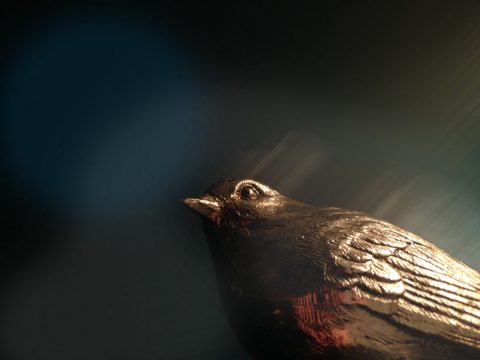You tell me there’s something you have to tell me, and then instead of telling me you show me, stand in front of me with your back to me, reach down and grab my hands and put them over your breasts, guide the index and middle finger of my left hand just under the fold of your left breast and inhale. “Do you feel it?” you ask.
“A lump?”
“A beak,” you say.
I feel something like a pair of needle-nose pliers try to grasp my fingers through your skin. I yelp, not because it hurts, but because even though you just told me to expect a beak I still expected a lump. “What is that?” I ask, even though I can only think of one thing that has a beak.
After we’ve gone to the doctor and reviewed the X-rays and discovered that it isn’t just a beak but a beak attached to a bird that’s made its home between your third and fourth rib, I decide that it’s a robin, though the X-rays are inconclusive beyond that it’s a small songbird, most likely a tanager or thrush, and migratory. I decide it’s a robin because the girl I dated before you was named Robin and this is just the kind of thing she’d do.
“The thing of it is,” I say, “she just can’t accept that I’m with someone else,” but the thing of it really is I’m not unhappy with the company. When you fall asleep I put my ear against your breast and can hear her cooing, and when it rains I run outside and collect worms off the sidewalk that I feed the little beak that pokes out of your mouth when you’re asleep on your back. You say she doesn’t hurt you though your appetite has decreased significantly.
Every morning you wake up and wonder why you have the taste of earth in your mouth, and then for several days you don’t speak to me after catching me one night dangling worms over your face. You feel violated, which is valid, I say, but also you have to keep in mind that you’re eating for two now, which is where we fundamentally disagree: that you have a responsibility at all to the bird inside you, that she is anything more than a parasite, to which I remind you that even parasites have value. “In the nineteenth and early part of the twentieth century,” I say, “leeches had a great many medicinal properties.”
I suggest taking up activities complementary to the bird inside you and focusing less on your differences and more on the common ground you share, mutual interests: less on how she can fly and you have a degree in Comparative Literature and more on your shared love of the walnut. Or proximity to your spleen. Instead you decide that you are now a cat person. I come home from work one day to find a large tabby in our bed surrounded by a harem of plush bird toys filled with catnip. You call her Diana, after the goddess of the hunt. She sleeps on your chest and draws blood whenever I come near, and of everyone involved, I don’t doubt that Diana knows her purpose here more than anyone else.



 The core workshop of SmokeLong Fitness is all in writing, so you can take part from anywhere at anytime. We are excited about creating a supportive, consistent and structured environment for flash writers to work on their craft in a community. We are thrilled and proud to say that our workshop participants have won, placed, or been listed in every major flash competition. Community works.
The core workshop of SmokeLong Fitness is all in writing, so you can take part from anywhere at anytime. We are excited about creating a supportive, consistent and structured environment for flash writers to work on their craft in a community. We are thrilled and proud to say that our workshop participants have won, placed, or been listed in every major flash competition. Community works.